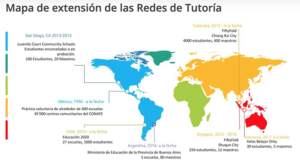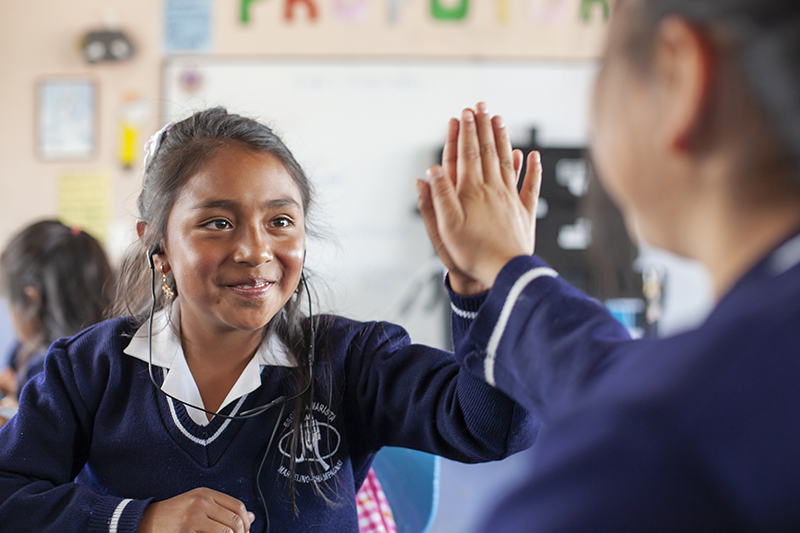Like Newton discovering his laws
“Before I was a completely different person: unable to engage in conversation with anyone because of my insecurity”, “I felt a bit weird at first because it was so very different: when I had my first Mentor, I wanted him to give me the answers, but then I realised that finding it yourself gives you the satisfaction that you are actually learning something”, “The teacher guides you, but never gives you the answer. And then one day I realised that I was constructing my own knowledge”, “It’s like you’re Newton, discovering his laws!”
One after the other, the testimonies of the young students of the distance learning secondary school in Zacatecas, Mexico, unravel in a moving documentary the secrets of the Mentoring Networks, the learning methodology that changed their lives: freedom, emotion, transformation, the satisfaction of knowing that you are constructing your own learning.
“Mentoring allows us to combine the hardest part of learning, which is academic knowledge, with the most subjective and sensitive part, which is the thrill that learning provokes, or the anguish that comes from not understanding something, or the joy that comes from the freedom to express what one feels. In any other form of educational relationship, it is not possible to bring them together,” explains one of the teachers from Zacatecas.
What is it and how does it work?

Expansion of Mentoring Networks. Image: Mentoring Networks.
Redes de Tutoría (Mentoring Networks) began in Mexico more than 25 years ago as a project to support secondary school students in rural communities in Mexico. Today the model has expanded to 34,000 urban and rural schools in the country and has already been extended to schools in Chile, Singapore, Thailand and Indonesia, working especially in vulnerable schools. It has also been selected for several years by the HundrEd organisation as one of the 100 most inspiring innovations in the world. But what exactly is this initiative and what does it consist of? How does it work and where does the secret of its success lie?
Let’s think for a moment about the optimal way in which people learn: first of all, curiosity and interest in a subject that interests us come into play, then research and the search for knowledge. Moreover, when we master the knowledge of a subject that interests us, we are eager to teach that subject to others.
The Mentoring Networks are based on three basic premises: 1) giving as much control as possible to the learner over what they want to study, 2) organising a dialogue, guided and assisted by the Mentor, about the discovery that the learner must make for themselves, (Elmore, 2016) and 3) encouraging all students to teach what they have mastered, thus distributing the ability to teach and building learning networks that transcend the school setting and pass on to the whole community.
How is this reflected in the Mentoring Networks model?
- Freedom of choice. First of all, the teacher offers students several topics from which they can choose the one that interests them the most.
- Once the student has made his/her choice, he/she starts an individual line of research, guided by his/her Mentor. The mentor should confront the learner with a challenge for him/her to use his/her own resources to solve. Because what matters the most is not so much the result but the reflection on the learning process itself, which is the weapon we all have to be able to continue studying.
- This is where another of the basic foundations of the method comes into play: dialogue. Based on the learner’s prior knowledge and by asking questions, the mentor guides the learner to find his or her own answers and elaborates on the areas that require more attention.
- Public presentation. Once the research has been completed, the student must prepare a public presentation in which he/she presents what he/she has learned and how he/she did it.
- Learning networks. Finally, the student becomes a Mentor for other students interested in the subject she or he has now mastered, through the development of a “mentoring script”, which makes them reflect on their learning process, thus developing the metacognition that will enable them to continue learning in the future.
In this way, knowledge and education cease to be a univocal process in which the teacher is the only source of knowledge that students receive passively. Mentoring empowers learners and gives them self-confidence and self-assurance. Its transformative power is borne out by the testimonies of those students who have tried it.
Experts have also praised the great benefits of mentoring as a learning method: “because of the importance of what it teaches and the power of what it achieves” (Elmore, 2016).
To find out more: The ABC of the mentoring relationship. (2020). Mentoring Networks.
REFERENCES
Elmore, R. (2016). Reflections on the contribution of mentoring to the future of learning. Mentoring Networks.
Mentoring Networks. The mentoring relationship. (Viewed on 18 September 2022). https://redesdetutoria.com/la-relacion-tutora/






